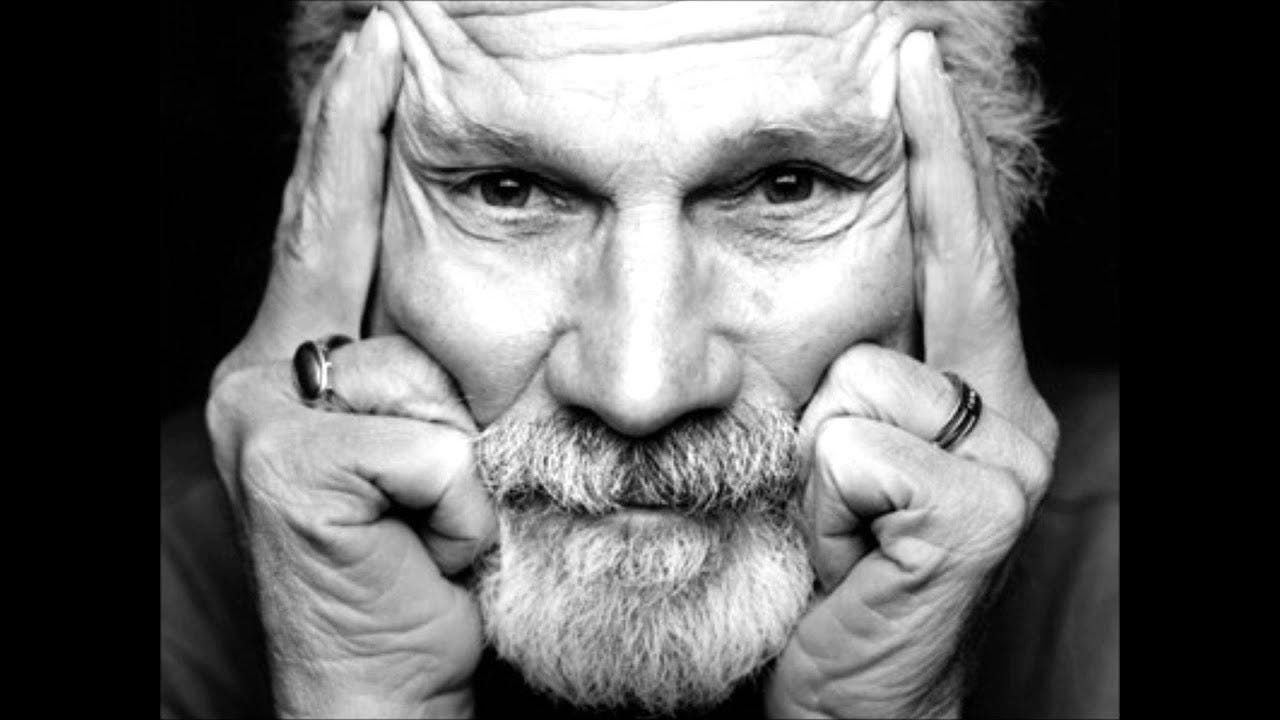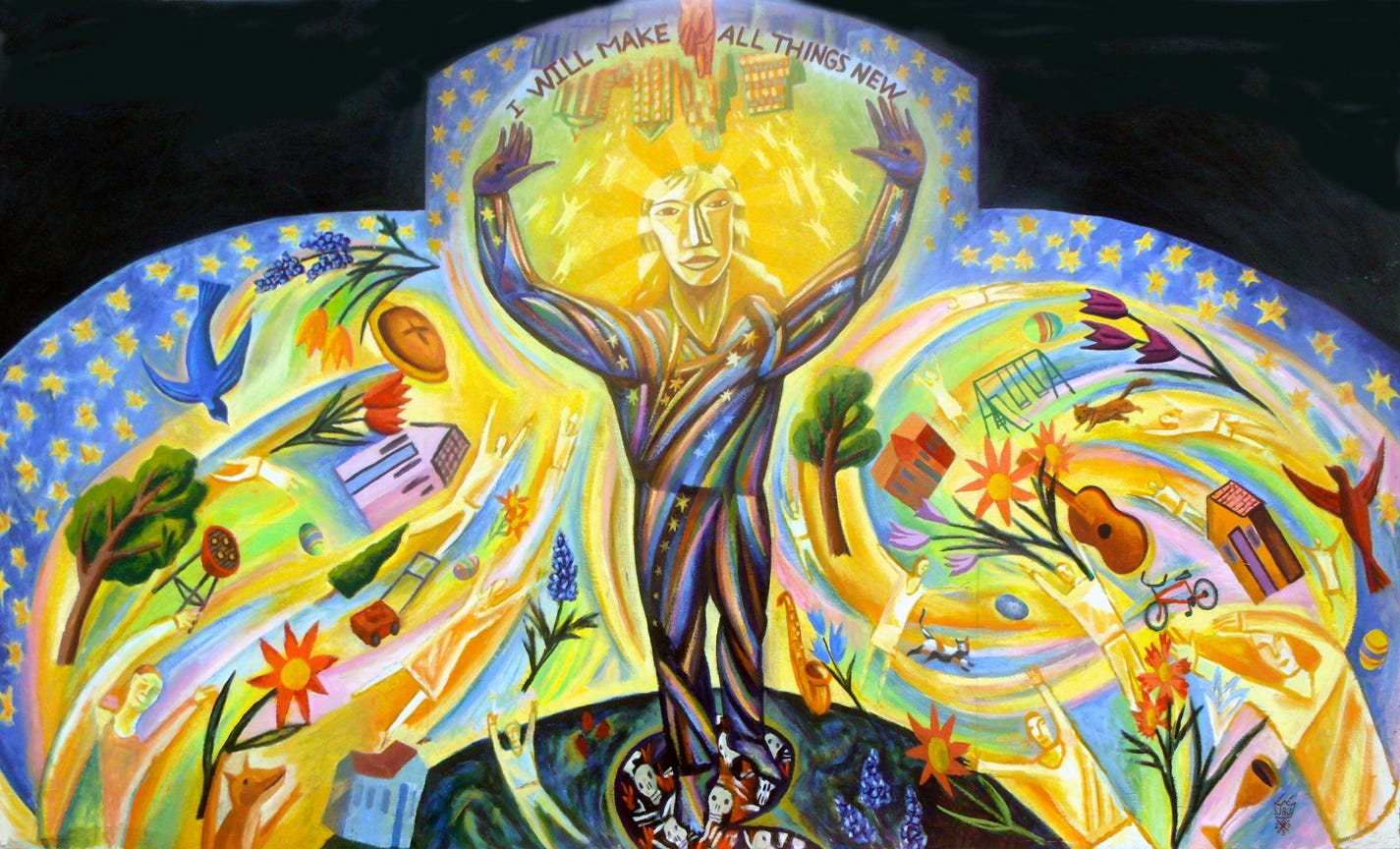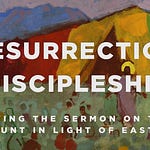“Now that you have purified your souls by your obedience to the truth so that you have genuine mutual love, love one another deeply from the heart. You have been born anew, not of perishable but of imperishable seed, through the living and enduring word of God.”[a]
1 Peter, a letter of joy from our living hope in our resurrected Lord Jesus Christ, takes a shift this Sunday. Last week, we considered how the joy of the resurrection permeates every nook and cranny of our lives, causing our Easter celebration to continue far beyond the life of the potted lilies and tulips that decorated our worship spaces on Easter Sunday. The joy of the Lord’s resurrection is ours as we live with new hope that the world's ways will wilt away.
Joy is our emotional response to the living hope we have as a result of Christ’s resurrection, and our epistle letter takes a turn toward the implications of the joy-filled new life we all have.
“Love one another deeply from the heart.”
Love.
It sounds pretty straightforward and easy.
Because we have been formed out of love for familial love and God has given you new birth, you are to love one another.
Love in the way famed fictional-recording artist Billy Mac instructs us to in the hit movie Love Actually – from your fingers to your toes.
Love the person in the pew next to you.
Love the person who has not responded to the text message you sent days ago.
Love your spouse, partner, children, best friend, mail person, Uber driver, stranger on the street, and the pastor who grinds your gears.
Love the person you tell yourself you will never be able to love.
Love the person others tell you is not worthy of your time, let alone your love.
Love the person you hate.
Remember Christ’s command to love your neighbor as yourself and love yourself.
Love; plain and simple, yet a seemingly impossible task.

We close most worship services declaring that the love of God our creator is yours. The pastor will say something like, “Go forth with the love of God our Creator.” That declaration, “Go forward from this place knowing that God, the One who created and ordered the cosmos, loves you,” can feel like the period we place at the end of the worship service. Still, the truth is, because we have been formed into a new living hope, that love is the starting point for how we are to engage the world we are being sent into after the last words are said and the final notes of the postlude are played.
Go forth from this place to love because you are loved. According to 1 Peter, the church's task is to be a community transformed by the overwhelming love of God for the sake of loving the world.

Go and love.
Not go and be do-gooders doing good things.
Go and love.
Not go and make the world a better place.
Stanley Hauerwas writes, “The task of the church is not to make the world a better place. The task of the church is to be the church, to be a community that loves one another as Christ loved us. When we love one another in this way, the world cannot help but be transformed.”[b]
Published over a decade ago by then-pastor and author Rob Bell, Love Wins attempted to answer the question, would a loving God send people to eternal torment forever? Would God, who created and orders the cosmos, who knitted each of us in our mother’s wombs, send people to eternal torment in a fiery furnace forever? Is there a limit to God’s love?
You can imagine the response to this book – affirmation for an evangelical pastor willing to speak beyond the harmful narrative that there is a limit to God’s love or condemnation because, for some, God’s love for creation is limited by certain sins.

What’s always bugged me about the condemnation for this book is that to say that there is a limit on the love God then places limits on how we are to love one another. If God does not love us or does not love those who commit certain sins (all the while being willing to look the other way to others), how can we love one another?
How can I, as your pastor, expect you to love one another if there are somehow limits on the love of God?

Over the past 5.5 years, I’ve officiated weddings and funerals here in the sanctuary, backyards, and funeral homes (though I have yet to do a wedding in a funeral home). Paul’s timeless words to the church in Corinth are the most famous scripture text for these services.
“Love is patient; love is kind; love is not envious or boastful or arrogant or rude. It does not insist on its own way; it is not irritable or resentful; it does not rejoice in wrongdoing, but rejoices in the truth. It bears all things, believes all things, hopes all things, endures all things.
Love never ends.”[c]

The idea in choosing these texts is that the text points to the couple or person being celebrated as an exemplar of love. After all, especially at weddings, hearing what love is and then being told by Jesus to love our enemies is excellent advice for newlyweds, those celebrating decades of marital bliss, and those who have sworn off marriage altogether.
The love described by St. Paul is the love of Christ. It is this love, the love of God, that called each of us into existence. It’s not that we’re supposed to have this kind of love for each other, ourselves, and our enemies, but that God is patient, God is kind, God keeps no record of wrongs, God bears all things, hopes all things, and endures all things.
It’s not that we’re supposed to have this kind of love for each other, ourselves, and our enemies, but that God is patient, God is kind, God keeps no record of wrongs, God bears all things, hopes all things, and endures all things.
What I point out every time a couple or family insists on using this text is what our epistle reading makes clear to us: the only reason we can love one another is because of the power of death could not stomp out the love we have from God, and the love of God.
The love of God wins.
The love of God has won, therefore, go and love another.
Unconditionally.
You don’t have to like the person sitting next to you; you might even loathe them, but the transformation happening in us because of the new life we have in Jesus Christ compels us to love them at the very least.
And the love we show one another is not for the sake of being do-gooders in our community or to make the world a bit brighter for someone having a bad day or dealing with calamity. No, we love because we are loved.
That’s it.
And when we love and look upon those around us and those we have yet to meet with love as the starting point, we are transformed.
God has been in the business of loving you, loving creation since “a wind from God swept over the face of the waters,”[d] and there was light.
The love of God is not simply a passive feeling but an active force that transforms and renews both us and the world around us. Robert Capon makes the point that God’s love is not an emotion. It is an active force within us, working to make us more loving – and by making us more loving, to make us more human. It is not a sentimental feeling of warmth and comfort but the power of the Creator, constantly renewing the life of the world and calling us to be part of that renewal.
The living hope we hold because of the empty tomb is grounded in God’s unwavering love.
“Love one another deeply from the heart” because, after all, you are loved, and love is all you need.
[a] 1 Peter 1:22-23, NRSC
[b] Stanley Hauerwas. Resident Aliens: Life in the Christian Colony.
[c] 1 Corinthians 13:4-8, NRSV
[d] Genesis 1:2, NRSV





















Share this post